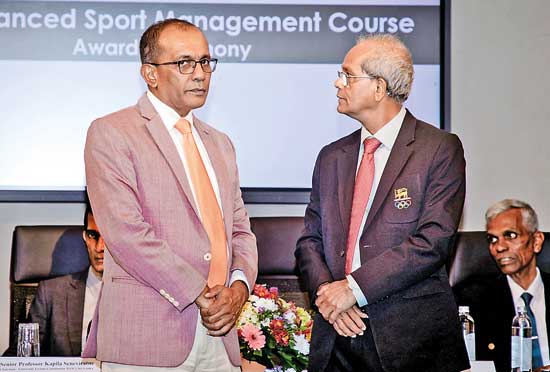NOCSL crisis deepens; another one bites the dust
Following the suspension of the Chandana Liyanage, the assistant secretary of the National Olympic Committee of Sri Lanka (NOCSL) on Tuesday over allegation of misconduct and constitutional violations, majority of the NOCSL membership boycotted Wednesday’s Special General Meeting (SGM), forcing it be adjourned without a quorum.
They were boycotting the meeting against what they called was a ‘unilateral’ suspension of the Assistant Secretary ahead of the SGM. President Suresh Subramaniam said he has now called for a meeting again on April, 18, 2025 as per the constitutional requirement.

Chandana Liyanage (left) and Maxwell de Silva are suspended, but still haunt the NOC with an uncertain majority - File pic
In a strongly worded letter dated April 8, NOCSL Subramaniam announced Liyanage’s immediate suspension pending further inquiries into multiple violations including financial irregularities, collusion with other suspended officials, and unauthorised communications with international sporting bodies.
This development follows months of turmoil at Sri Lanka’s premier sport body.
Earlier, Secretary General Maxwell de Silva was suspended following serious allegations of financial misconduct and governance issues. His suspension came after the International Olympic Committee (IOC) and Olympic Council of Asia (OCA) slapped a funding suspension until the governance issue is solved.
Subsequently, Treasurer Gamini Jayasinghe and Vice President Suranjith Premadasa tendered their resignations under mounting pressure from the IOC and OCA which refused to release funds until all corrupt elements are removed.
Observers note that these suspensions and resignations have laid bare the extent of institutional dysfunction within the NOCSL, which has struggled with transparency and integrity issues for the past two years.
According to the suspension letter obtained by this newspaper, Liyanage faces four primary allegations that President Subramaniam described as “unbecoming and/or unlawful and/or unethical of an Executive Member”.
Subramaniam says Liyanage had allegedly colluded with former Secretary General Maxwell de Silva in ‘several unethical activities’ during his tenure. Second, ‘several financial irregularities and/or discrepancies’ were discovered during Liyanage’s chairmanship of the Procurement Committee, though specific details of these discrepancies were not disclosed in the letter.
Third, and perhaps most damning, is the allegation that Liyanage accepted per diem payments for four major international sporting events—the 2022 Commonwealth Games in Birmingham, the 2018 and 2023 Asian Games in Jakarta and Hangzhou respectively, and the 2024 Olympic Games in Paris—in direct contravention of Article 25 of the NOCSL Constitution, which explicitly prohibits such payments.
Finally, Liyanage allegedly bypassed President Subramaniam’s authority by directly corresponding with Jerome Poivey, Associate Director of Institutional and Governance Services at the IOC, on December 4, 2024. This action violated Article 15(1) of the NOCSL Constitution, which designates the President as the legal representative of the organisation.
The suspension comes with extensive restrictions that effectively remove Liyanage from all NOCSL operations. He is barred from making any representations in his official capacity, prohibited from visiting NOCSL premises or using its resources (including electronic devices), and forbidden from communicating with any national sports federation or international sports organisation in his capacity as Assistant Secretary.
President Subramaniam’s letter concludes with a stern warning that non-compliance could result in criminal charges, stating he “will not hesitate to initiate legal action” to protect the NOCSL’s interests.
Sources close to the matter indicate that the IOC had issued multiple warnings to the NOCSL over the past year regarding governance standards. The suspension of Liyanage appears to be part of a broader attempt to address these concerns before more severe sanctions are imposed by international authorities.
President Subramaniam has promised a comprehensive restructuring of the NOCSL’s governance framework once investigations are complete, but restoration of international confidence may prove challenging given the depth and breadth of alleged improprieties that have come to light.


